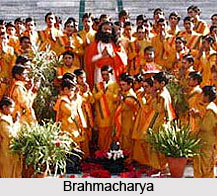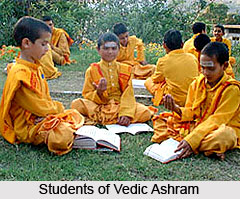 Brahmacharya refers to that Vedic stage of life when we are still students. This is the first of the four stages of life. The ashram system originated in the Vedic age and was widely followed throughout India. The reference of such a system is found in ManuSmriti. Brahmacharya literally means the search of Brahma or the absolute spiritual power with the help of a teacher. This phase constituted of the first 20 to 25 years of an individual`s life. After the thread ceremony or the Upanayanam, Brahmacharya ushers in.
Brahmacharya refers to that Vedic stage of life when we are still students. This is the first of the four stages of life. The ashram system originated in the Vedic age and was widely followed throughout India. The reference of such a system is found in ManuSmriti. Brahmacharya literally means the search of Brahma or the absolute spiritual power with the help of a teacher. This phase constituted of the first 20 to 25 years of an individual`s life. After the thread ceremony or the Upanayanam, Brahmacharya ushers in.
According to the Vedic Indian society to practice Brahmacharya the student needs to go and live with his teacher. Thus evolved the Gurukul system in ancient India. Although widely stated that Brahmacharya means celibacy what it really means is self-restraint. Hence it is not limited to sexual connotation. For leading the life of Brahmacharya one needs complete dedication to his Guru, discipline and concentration. Education contributes a lot to the character and growth of an individual and hence he needs a guru or a teacher who would guide him successfully. For this he also heeds to stay away from distractions and hence the practice of celibacy is strictly to be followed.
 In Gurukul system the knowledge of Vedas, Sashtras and Upanishads are imparted to the students or brahmacharis. These teachings are to guide him in leading the next three stages of life. The term Brahmacharya also means sexual continence according to yoga. This is a way of preserving sexual energy. Celibacy has a scientific foundation. Over indulgence in sexual activities can lead to loss of energy and health hazards. As a result it is a crucial stage for the teenagers. Besides this Brahmacharya also helps to develop the prowess to abstain form materialism. Vices like greed, anger, envy, pride, sloth and possessiveness can be curbed through the practice of Brahmacharya.
In Gurukul system the knowledge of Vedas, Sashtras and Upanishads are imparted to the students or brahmacharis. These teachings are to guide him in leading the next three stages of life. The term Brahmacharya also means sexual continence according to yoga. This is a way of preserving sexual energy. Celibacy has a scientific foundation. Over indulgence in sexual activities can lead to loss of energy and health hazards. As a result it is a crucial stage for the teenagers. Besides this Brahmacharya also helps to develop the prowess to abstain form materialism. Vices like greed, anger, envy, pride, sloth and possessiveness can be curbed through the practice of Brahmacharya.
The concept of Brahmacharya is not restricted to Hinduism only. Buddhist monks and Jains have a similar commitment to life. Hence the later Vedic Age supported a way of life that would lead to higher consciousness and life. Brahmacharya, in a way, thoroughly prepared the young minds for the world.



















